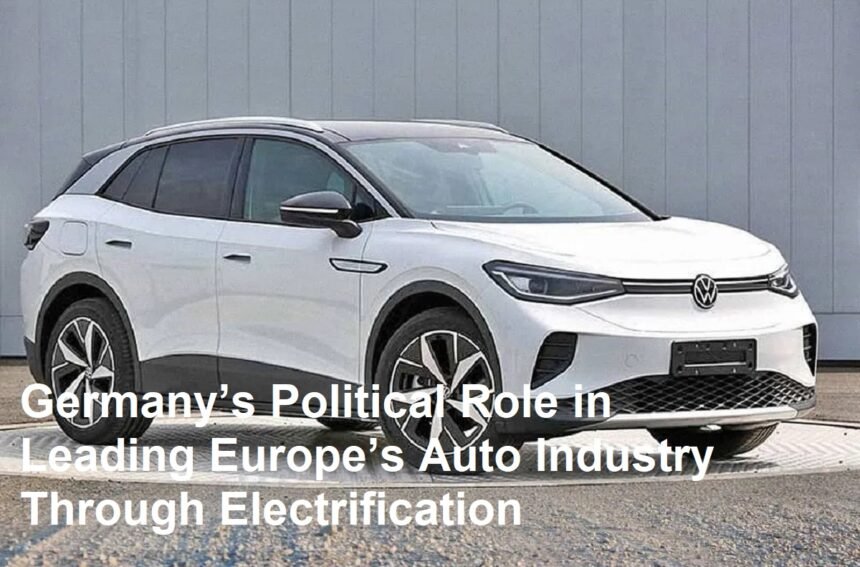Introduction: Why German Politics Shapes European Cars
Germany is more than just the heart of Europe—it’s the engine behind the continent’s automotive power. From Volkswagen to BMW and Mercedes-Benz, German carmakers have defined global standards for decades. But as the world shifts toward electric mobility, German politics in the European auto industry is now more crucial than ever.
The country isn’t just adapting to electrification; it’s actively shaping EU policies that will guide how millions of Europeans drive in the coming decades.
Germany’s Dual Role: Industry Leader and Policy Influencer
Political Power Meets Industrial Strength
Germany is Europe’s largest economy, and the automotive sector makes up nearly 5% of its GDP. That means any policy decision made in Berlin or Brussels has ripple effects across the continent.
From trade rules to emission standards, German politicians often lobby to protect local automakers while balancing EU climate commitments.
Volkswagen and European Politics
The phrase Volkswagen and European politics captures the strong ties between Germany’s car industry and EU institutions.
- VW is Europe’s biggest carmaker, with influence in Brussels and national governments.
- It actively shapes EU emissions standards and subsidies for EVs.
- After the “Dieselgate” scandal, VW doubled down on EV investments to regain political and public trust.
The EV Transition in Germany
Germany’s Electrification Roadmap
The German EV transition is central to Europe’s climate and industrial policy. Key steps include:
- Phasing out combustion engines: Germany supports the EU’s 2035 ban on new gas and diesel cars.
- Infrastructure investment: Billions are being spent to expand charging stations across cities and highways.
- Battery production: German-backed projects like Northvolt and VW’s own gigafactories aim to reduce dependence on China.
Challenges on the Road
- High EV prices make it difficult for mass adoption.
- Charging infrastructure still lags behind demand.
- Supply chain dependence on critical minerals creates geopolitical risks.
EU Policy and Germany’s Influence
The EU’s Electric Car Regulation
The EU electric car policy—notably the 2035 ban on combustion cars—is one of the most ambitious climate regulations worldwide. Germany initially resisted but later supported the measure after securing concessions for e-fuels.
How Germany Shapes EU Rules
- Lobbying power: German officials and automakers push for policies that balance climate goals with industrial competitiveness.
- Innovation incentives: Berlin advocates for subsidies and research funding to support local EV startups and battery projects.
- Climate vs. jobs dilemma: Policies must keep Germany’s car industry competitive while protecting hundreds of thousands of workers.
The Global Impact of German Politics in the Auto Sector
European Leadership, Global Competition
By driving EU policy, Germany indirectly pressures other regions. Automakers in Asia and North America must adapt their strategies if they want to sell in Europe—the world’s second-largest car market.
The China Factor
China currently leads the EV market with affordable models and strong battery supply chains. Germany’s political stance often reflects the need to stay competitive with Chinese EV giants like BYD and CATL.
Practical Insights for Different Audiences
For Car Buyers
- Expect more EV choices: German brands like VW, BMW, and Mercedes will release a wide range of EVs in Europe and beyond.
- Look for incentives: EU and German policies often include tax credits and subsidies that make EVs more affordable.
- Future-proof purchases: Cars with strong charging network support and longer warranties will hold better value.
For Investors
- Follow German automakers: Companies like Volkswagen are heavily investing in electrification and battery plants.
- Watch policy updates: EU regulations influenced by German politics directly impact EV demand and automaker profitability.
- Supply chain opportunities: Battery recycling, charging infrastructure, and green energy are growth sectors tied to this shift.
For Businesses and Policymakers
- Adapt fleets early: Electrifying logistics or service vehicles can save costs in the long run.
- Leverage EU funding: Many EU programs, shaped by German influence, support green mobility projects.
- Collaborate regionally: Partnerships across Europe will be key for securing minerals, innovation, and energy resources.
Common Questions About Germany’s Role
Will Germany Lose Its Automotive Edge?
It’s a risk, especially with rising competition from China and the US. But with strong political support and global brand recognition, German automakers are positioning themselves as EV leaders.
What About Workers in the Auto Industry?
Electrification requires fewer workers than traditional carmaking. That’s why German politics emphasizes retraining programs and state support for job transitions.
How Will This Affect Car Prices?
Initially, EVs will remain pricier than combustion cars. But as battery costs drop and EU policies expand subsidies, EVs are expected to reach price parity in the 2030s.
Conclusion: Germany at the Wheel of Europe’s EV Future
The politics of Germany in the European auto industry is not just about local interests. It’s about shaping the future of mobility for the entire continent. From Volkswagen’s lobbying in Brussels to Germany’s EV transition roadmap and EU electric car policies, German politics is steering Europe toward electrification—while balancing climate goals with industrial competitiveness.
For buyers, investors, and businesses worldwide, the signals coming from Berlin and Brussels are clear: the future is electric, and Germany intends to lead the charge.
Do you think Germany’s political influence will help Europe dominate the EV era, or will global competition leave German automakers behind?
Share your thoughts in the comments and join the conversation! Don’t forget to pass this article along to friends and colleagues who follow the future of mobility.












